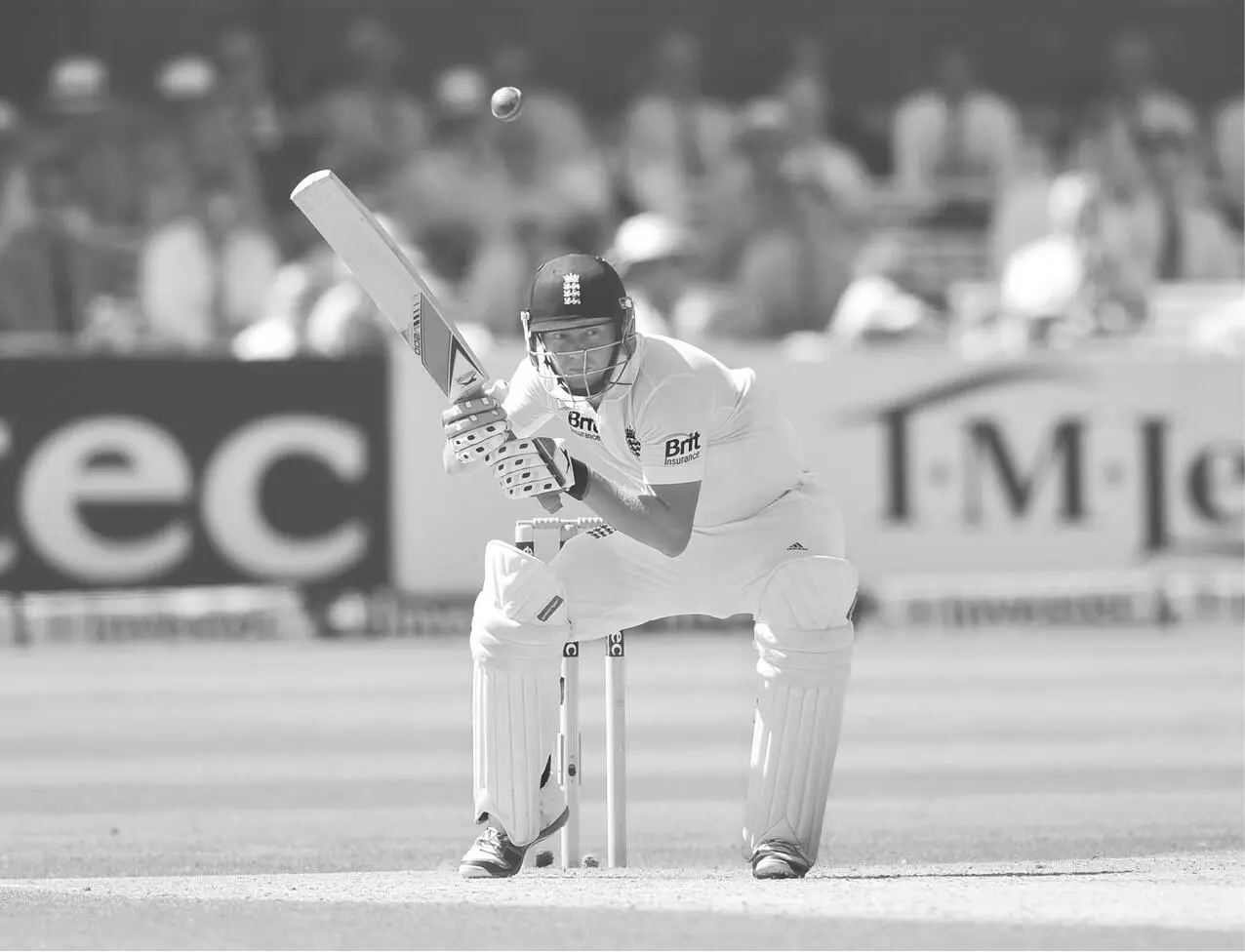I know how I jumped from school to club and then from club to Yorkshire’s academy. I know how I got from the second XI into the County Championship side. And I know how I became an England player.
I’ve always tried to honour my dad and what he did for Yorkshire, which for him frequently meant putting the county’s cause before his own. But my late boyhood, my early teens and then my adolescence were full of net sessions and practice drills he never witnessed, ups and downs he never knew about and matches he never saw. My mum was always there. So was Becky. Often, so were my maternal grandpa Colin, who took on the role of surrogate dad as well as his grandparent duties, and my grandma Joan. My grandpa died only seven months ago. I’m still grieving for him; something in me always will. We travelled en bloc, inseparable as a family. Reflecting on it all now, I know categorically that I wouldn’t have come close to a career in cricket without them. In particular I’ve got to where I am because of my mum and Becky. That’s why everything I’ve ever strived for – and everything I’ve achieved – has been done for them. I’ve wanted to look after them. I’ve wanted to repay them for their backing, their constant belief, even their gentle but persistent nagging of me sometimes.
Now I want to score this century for them too.
If I get it, there’ll be tears shed later on from each of us. We’ll look at one another, and shared memories of the past will make words superfluous.
Just one more run …
There’d be an odd irony about this century, a couple of small details that will make it seem as though everything about it was somehow preordained.
Perhaps so.
Batting is a tightrope walk, and it’s always the precarious next step that bothers you. At the crease, you’re secure only in the ball you’ve just faced. It’s gone and done with, and can’t get you out. But however well you’ve coped with it – you’ve picked the spin or read the late swing, you’ve pulled the bat away from something steeply rising or you’ve brilliantly clobbered a delivery on the up through extra cover – is then irrelevant. What matters is only the battle of the next ball. The nearer you get to a milestone score, especially a hundred, the more you can struggle. You have to handle the sense of anticipation in the crowd and also the expectation you begin to heap on yourself. The impulse to rush towards your hundred is perfectly natural and very human. There’s a desire to get there quickly, so the accomplishment is already behind you. You can end up doing something rash. Or you can find the process debilitating and a torture. Some batsmen call it The Demon on Your Shoulder. Others call it The Joker or The Grudge. You suffer a kind of paralysis because of it. I know that from experience.
I’ve been in the 90s once before for England. That was against South Africa too; at Lord’s, of all places, where to appear on the honours board is a kind of cricketing ennoblement. It was only my fourth Test. I’d made just 38 runs from four innings in the series against the West Indies at the start of the same summer. I was out of the side for the beginning of the series against South Africa to no one’s surprise – including my own, really.
You probably won’t remember why I found myself unexpectedly at Lord’s, facing a pace attack of Morne Morkel, Vernon Philander and Dale Steyn. It was because of what Wisden euphemistically called ‘textual impropriety’. Kevin Pietersen was dropped after allegations that he’d sent disparaging text messages about Andrew Strauss to some of the South African side during the Test at Headingley. It took some guts to axe KP; he’d scored a blazing 149 there, every stroke emphasising sublime, savage power. It also took some guts to bring me in as his replacement so quickly after I’d been dropped. The response, from commentators and critics alike, hovered between the sceptical and the scathing.
Against the West Indies, I’d had problems handling the short ball. The media saw me as a lame duck. The consensus was that the speed of Morkel, Philander and Steyn – fiercer collectively than anything I’d come across before – would wreck me. I’d be sliced and diced every which way, they said. My technique was microscopically picked apart. My temperament was picked apart too, as though I was on a psychiatrist’s couch. The chief complaints against me – in no particular order – were:
That I wouldn’t cope with the bouncer.
That I wouldn’t cope with the occasion.
That I wouldn’t cope, full stop.
Morkel, it was prophesied, would be my bête noire. He’s nearly six-foot-six tall and he has such long arms. If he held them outstretched, he’d present a passable imitation of The Angel of the North . This means every delivery comes at you like something falling off a church steeple. Most batsmen wouldn’t relish facing him if he had a Granny Smith in his hand, let alone a shiny, hard-seamed Duke.
I’d got to know and like Morkel when he ever-so-briefly played for Yorkshire at the beginning of the 2008 season. My mum is the club’s Cricket Administrator and she liaises with the players, making sure those from overseas settle in. She cooked dinner for Morkel at our home and took care of him. He calls her ‘my Yorkshire mum’. Without the ball in his hand he’s a kindly, gentle man. With it, he’s more than a nuisance. Even in the nets, off a shortened run, he was fast enough to make most of his contemporaries look merely ‘nippy’.
In the swirl of controversy around KP, the build-up to the Test became weirdly askew; it was all about the man who wasn’t there. The furious saga about his mobile phone, what was or wasn’t said on it and whether the words constituted innocuous ‘banter’ or not, became a pitched battle. The claims and counter-claims and the accusations and denials swallowed up acres of newsprint and hours of TV, and provoked a blizzard of social-media comment, a lot of it X-rated. I was portrayed as an unfortunate sap, obliged to take on the impossible job of replacing one of the best batsmen on God’s earth. It was assumed I’d turn up, barely trouble the scorers and seldom be heard of again. Since I was expected to fail, the pressure on me wasn’t anything like the pressure on Strauss – about to play his hundredth and last Test – and England’s coach, Andy Flower, both of whom had demonstrated such a fabulous faith in my abilities, an act for which I’ll be eternally thankful. If I cocked up, the flak would be flying at them first and me second.
That Test, the final of the series, wasn’t just about bragging rights and kudos either. We were one down and attempting to cling on to our status as the top Test nation. But, when I came in, we were 54 for four and staring calamity in the face. Morkel was ripping it in at almost 90 miles an hour. He welcomed me with a short leg and a leg gully, which was hardly a code in need of cracking about the length and line of his attack. I’d prepared for it. I’d been in the nets, where our batting coaches, Graham Gooch and Graham Thorpe, had for hours flung short balls at me from a dog stick. I also wore for the first time cricket’s equivalent of a bullet-proof vest – a chest pad.

(© Glyn Kirk/AFP/Getty Images)
The third ball Morkel bowled was six inches short of a length and jumped at me like fat spitting from a pan. I bent down a little and yanked my head out of its flight-path. There were a few more like this – or of a similar variety, some spearing towards my ribcage – before he switched to around the wicket, tilting the angle and making it sharper. When you’re being peppered like this, you’re always waiting for the inevitable – the yorker that’s fast enough to turn your toes to pulp or send a stump cartwheeling. It came, and I was ready for it. I got into position and clipped the thing away for four, which was a turning point psychologically. I’d stood up to Morkel, and now he – along with Steyn and Philander – realised I wasn’t a soft touch. I eased to 50 without much bother. I eased to 90 in the same way. I imagine that whoever’s responsible for putting the names on that oak honours’ board in the Lord’s dressing room was preparing to stencil my own there. Then I got stuck, as if in quicksand. I inexplicably couldn’t get the ball away.
Читать дальше













